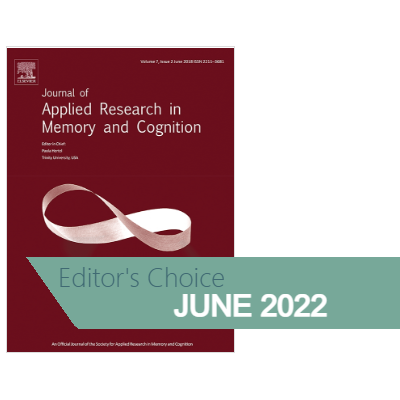JARMAC Editor's Choice: June 2022
/Psychological myths about evidence in the legal system: How should researchers respond?
AUTHORS: KATHY PEZDEK & DANIEL REISBERG
This article considers six myths regarding mistaken beliefs about psychological processes shaping legal evidence (e.g., the idea that police officers are more reliable eyewitnesses than civilians and that they can reliably detect deception) and outlines the cognitive mechanisms that contribute to the maintenance of these myths. In debunking the myths, the authors discuss why myths related to cognitive processing in the real world should be addressed and suggest multiple vehicles for doing so. The authors consider both the benefits and the obstacles for each path, and end by suggesting a novel resource for debunking myths in the legal system.
Not just stimuli structure: Sequencing effects in category learning vary by task demands.
AUTHORS: VERONICA X. YAN & BRENDAN A. SCHUETZE
The sequence in which category examples are studied can greatly affect how well category rules are learned and how well they are retained. In three experiments, the authors examined how attentional and memory processes work together to shape category learning. Participants were presented with Chinese characters and their meanings and then asked to guess the meanings of new characters. Category-related characters all shared a subcomponent, but participants had to abstract this rule. Presenting characters blocked by category led to better initial acquisition—it directed learners’ attention to the subcomponent—but did not result in durable long-term learning (Experiments 1 and 2). When learners were alerted to the existence of the rules, however, there was a robust interleaving benefit that lasted over a day’s delay (Experiment 3). The authors conclude that sequencing decisions should not only depend on the stimuli but also the learning task.
Repeated recall of repeated events: Accuracy and consistency.
AUTHORS: EVA RUBÍNOVÁ, HARTMUT BLANK, JONATHON KOPPEL, ELIŠKA DUFKOVÁ & JAMES OST
In conversations and interview settings, people may be required to provide details of instances that were similar to other experiences. When this happens repeatedly, schema formation and interference due to similarity make recall and accurate source attribution challenging. In this article, the authors examine the accuracy and consistency of recall in these contexts by re-analysing five studies. Confusions were widespread across instances and across repeated retrieval attempts. There were, however, clear primacy and recency effects with first and final instances being recalled more accurately and consistently than the middle instances. The authors discuss potential mechanisms underlying these effects as well as their practical implications.
When fairness is flawed: Effects of false balance reporting and weight-of-evidence statements on beliefs and perceptions of climate change.
AUTHORS: MEGAN N. IMUNDO & DAVID N. RAPP
Presenting both sides of an issue is considered a feature of good journalism. However, false balance can result when equal platform is given to opposing views despite one view holding expert and evidentiary support. In three experiments, the authors examined whether exposure to non-consensus contrarian views affected perceptions of expert consensus and personal belief in climate change. Exposure to contrarian views reduced perceived expert consensus regardless of the expertise of the contrarian source. However, a weight-of-evidence statement helped to offset the negative effects of contrarian messages. The authors conclude that statements about the broader consensus of experts can encourage perceptions and understandings in line with empirical evidence.


